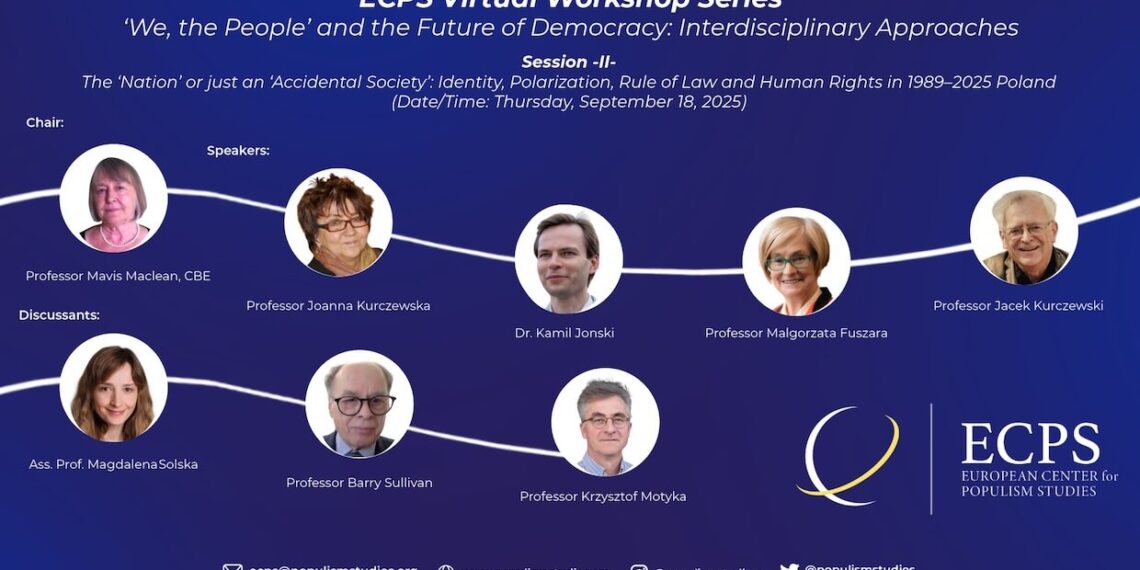On September 18, 2025, ECPS held the second session of the Virtual Workshop Series — “We, the People” and the Future of Democracy. Chaired by Professor Mavis Maclean (Oxford), the panel examined Poland’s democratic trajectory through themes of patriotism, constitutional conflict, human rights, and representation. Highlights included Professor Joanna Kurczewska’s call to recover Solidarity’s inclusive legacy, Dr. Kamil Joński’s analysis of Poland’s constitutional “quagmire,” Professor Małgorzata Fuszara’s exploration of contested women’s and minority rights, and Professor Jacek Kurczewski’s reframing of judicial representation. Discussants added comparative and moral-philosophical perspectives. The session concluded that Poland’s experience reflects global struggles: reclaiming inclusive traditions, defending institutions, and embedding rights remain vital for democratic renewal.
Reported by ECPS Staff
On September 18, 2025, the European Center for Populism Studies (ECPS), in collaboration with Oxford University, convened the second session of its Virtual Workshop Series — ‘We, the People’ and the Future of Democracy: Interdisciplinary Approaches. The session, titled “The ‘Nation’ or just an ‘Accidental Society’: Identity, Polarization, Rule of Law and Human Rights in 1989–2025 Poland,” brought together leading scholars to examine the Polish case as a lens into broader struggles over democracy, representation, and rights. Chaired by Professor Mavis Maclean (University of Oxford), the event highlighted Poland’s experience of post-1989 transformation, the contested legacy of Solidarity, constitutional polarization, and ongoing battles over women’s and minority rights.
Following the introduction of the programme and participants by Reka Koleszar on behalf of ECPS, Prof. Mavis Maclean, CBE (St Hilda’s College, University of Oxford) opened by situating the discussion within a wider European context. Reflecting on Britain’s surge of far-right populism, she posed a dilemma: should mass populist movements be regarded as authentic expressions of civic grievance, or as dangerous forces of hatred and violence? She expressed hope that the Polish experience could illuminate how democracies might redirect discontent toward renewal rather than demagoguery.
The first presentation, delivered by Professor Jacek Kurczewski on behalf of his wife, the absent Professor Joanna Kurczewska (Polish Academy of Sciences), revisited her long-standing work on Polish patriotism. Drawing on the legacy of Solidarity and the role of Father Jerzy Popiełuszko, she argued that inclusive, pluralist patriotism once united workers, intellectuals, and clergy, but that its legacy has since weakened. She warned that today’s exclusionary populism thrives on the failure to sustain that inclusive vision.
Dr. Kamil Jonski (University of Łódź) then addressed Poland’s constitutional polarization. His paper, “Single Text, Clashing Meanings,” traced how the 1997 Constitution, from its inception, was a battleground of rival axiologies. While liberals view it as a rights-based framework, conservatives interpret it through a lens of sovereignty and morality. The 2015 constitutional crisis, resulting in right-wing packing of the Tribunal, offered opportunity to impose one of those visions, and produced a constitutional quagmire with disagreement not only on values, but also legitimacy of institutions (including top judicial bodies).
Professor Malgorzata Fuszara (University of Warsaw) explored the contested trajectory of human rights. She distinguished between broad consensus on universal rights after 1989 and the divisive politics of women’s and minority rights. Abortion restrictions, stalled LGBTQ reforms, and uneven protections illustrate enduring resistance. Yet she also highlighted progress, including the redefinition of rape law and gender quotas in parliament, underscoring the unfinished task of fully integrating women’s and minority rights into Poland’s human rights framework.
Finally, Professor Jacek Kurczewski (University of Warsaw) presented his own paper on representation and the rule of law. He challenged populist claims that only elected politicians embody the nation, arguing that judges also represent the nation through law, oath, and culture. Reviving lay participation in justice, he suggested, could counteract populist narratives and strengthen judicial legitimacy.
The discussion was enriched by three international discussants. Dr. Magdalena Solska (University of Fribourg) highlighted the need to revisit the legacy of Solidarity for democratic resilience and probed the paradox of women’s electoral behavior. Professor Barry Sullivan (Loyola University Chicago) compared Poland’s constitutional struggles to US debates, raising questions about the gap between cultural appeals and economic policy. Professor Krzysztof Motyka (Catholic University of Lublin) drew attention to the moral-philosophical dimensions of rights discourse, from Father Popiełuszko’s defense of life to the linguistic shift from civic to human rights.
Together, the session illuminated Poland as a microcosm of global struggles: how inclusive traditions are eroded by polarized politics, how constitutions fracture under competing axiologies, and how rights remain contested terrain.


